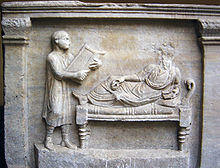Ancient Greece[edit]
The earliest people who could be described as "lawyers" were probably the orators of ancient Athens (see History of Athens). However, Athenian orators faced serious structural obstacles. First, there was a rule that individuals were supposed to plead their own cases, which was soon bypassed by the increasing tendency of individuals to ask a "friend" for assistance.[199] However, around the middle of the fourth century, the Athenians disposed of the perfunctory request for a friend.[200] Second, a more serious obstacle, which the Athenian orators never completely overcame, was the rule that no one could take a fee to plead the cause of another. This law was widely disregarded in practice, but was never abolished, which meant that orators could never present themselves as legal professionals or experts.[201] They had to uphold the legal fiction that they were merely an ordinary citizen generously helping out a friend for free, and thus they could never organize into a real profession—with professional associations and titles and all the other pomp and circumstance—like their modern counterparts.[202] Therefore, if one narrows the definition to those men who could practice the legal profession openly and legally, then the first lawyers would have to be the orators of ancient Rome.[203]
Ancient Rome[edit]
A law enacted in 204 BC barred Roman advocates from taking fees, but the law was widely ignored.[204] The ban on fees was abolished by Emperor Claudius, who legalized advocacy as a profession and allowed the Roman advocates to become the first lawyers who could practice openly—but he also imposed a fee ceiling of 10,000 sesterces.[205] This was apparently not much money; the Satires of Juvenal complained that there was no money in working as an advocate.[206]
Like their Greek contemporaries, early Roman advocates were trained in rhetoric, not law, and the judges before whom they argued were also not law-trained.[207] But very early on, unlike Athens, Rome developed a class of specialists who were learned in the law, known as jurisconsults (iuris consulti).[208] Jurisconsults were wealthy amateurs who dabbled in law as an intellectual hobby; they did not make their primary living from it.[208] They gave legal opinions (responsa) on legal issues to all comers (a practice known as publice respondere).[209] Roman judges and governors would routinely consult with an advisory panel of jurisconsults before rendering a decision, and advocates and ordinary people also went to jurisconsults for legal opinions.[208] Thus, the Romans were the first to have a class of people who spent their days thinking about legal problems, and this is why their law became so "precise, detailed, and technical."[208]
During the Roman Republic and the early Roman Empire, jurisconsults and advocates were unregulated, since the former were amateurs and the latter were technically illegal.[210] Any citizen could call himself an advocate or a legal expert, though whether people believed him would depend upon his personal reputation. This changed once Claudius legalized the legal profession. By the start of the Byzantine Empire, the legal profession had become well-established, heavily regulated, and highly stratified.[211] The centralization and bureaucratization of the profession was apparently gradual at first, but accelerated during the reign of Emperor Hadrian.[212] At the same time, the jurisconsults went into decline during the imperial period.[213]
In the words of Fritz Schulz, "by the fourth century things had changed in the eastern Empire: advocates now were really lawyers."[214] For example, by the fourth century, advocates had to be enrolled on the bar of a court to argue before it, they could only be attached to one court at a time, and there were restrictions (which came and went depending upon who was emperor) on how many advocates could be enrolled at a particular court.[215] By the 380s, advocates were studying law in addition to rhetoric (thus reducing the need for a separate class of jurisconsults); in 460, Emperor Leo imposed a requirement that new advocates seeking admission had to produce testimonials from their teachers; and by the sixth century, a regular course of legal study lasting about four years was required for admission.[216] Claudius's fee ceiling lasted all the way into the Byzantine period, though by then it was measured at 100 solidi.[217] It was widely evaded, either through demands for maintenance and expenses or a sub rosa barter transaction.[217] The latter was cause for disbarment.[217]
The notaries (tabelliones) appeared in the late Roman Empire. Like their modern-day descendants, the civil law notaries, they were responsible for drafting wills, conveyances, and contracts.[218] They were ubiquitous and most villages had one.[218] In Roman times, notaries were widely considered to be inferior to advocates and jury consults.





0 Comments